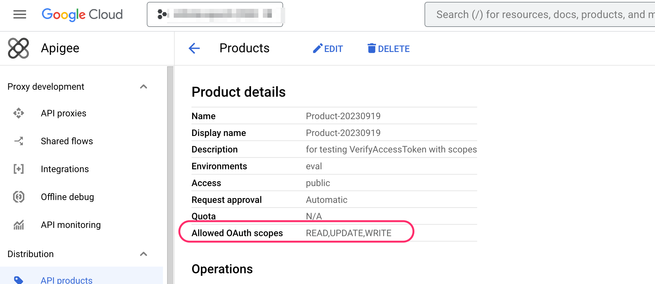- Google Cloud
- Cloud Forums
- Apigee
- GenerateAccessToken with Scope parameter for Clien...
- Subscribe to RSS Feed
- Mark Topic as New
- Mark Topic as Read
- Float this Topic for Current User
- Bookmark
- Subscribe
- Mute
- Printer Friendly Page
- Mark as New
- Bookmark
- Subscribe
- Mute
- Subscribe to RSS Feed
- Permalink
- Report Inappropriate Content
- Mark as New
- Bookmark
- Subscribe
- Mute
- Subscribe to RSS Feed
- Permalink
- Report Inappropriate Content
Hi,
I see a similar a question raised in 2021, but that seem to be have been resolved, since it was a problem in variable referencing (referring to query param instead of form param). In the response it was stated scope has to be added during auth-code generation for it to reflect in AccessToken.
In our requirement, I would like to use client_credentials grant_type; no auth-code flow. But would like to provide the option of restricting the scopes for generated tokens, to the client application. There is an optional parameter <Scope> in the policy. The API Product has the required scopes that are being set in the policy. Still the generated access token shows Scope as "". Should I be using a custom attribute for setting the scope and a custom implementation during verifyAccessToken to validate the scope, is that only option for this case? am I missing something?
Thanks & Regards,
Muthu
Solved! Go to Solution.
- Mark as New
- Bookmark
- Subscribe
- Mute
- Subscribe to RSS Feed
- Permalink
- Report Inappropriate Content
- Mark as New
- Bookmark
- Subscribe
- Mute
- Subscribe to RSS Feed
- Permalink
- Report Inappropriate Content
Hi Muthu
am I missing something?
I think so.
The OAuthV2 policy is a multi-purpose policy, and configuring it can get complicated. But it WILL work if you configure everything properly.
Configure GenerateAccessToken like this:
<OAuthV2 name="OAuthV2-GenerateAccessToken-CC">
<Operation>GenerateAccessToken</Operation>
<ExpiresIn ref="request.queryparam.lifetimems">1800000</ExpiresIn>
<RefreshTokenExpiresIn>691200000</RefreshTokenExpiresIn>
<SupportedGrantTypes>
<GrantType>client_credentials</GrantType>
</SupportedGrantTypes>
<GrantType>request.formparam.grant_type</GrantType>
<Scope>request.formparam.scope</Scope>
<GenerateResponse enabled="true"/>
</OAuthV2>
The text inside the Scope element is a variable name. It's not the actual desired scope. In my case I am using the form parameter named "scope" therefore the variable name I use is request.formparam.scope . The client request for such a token will be like this:
curl -i -u $CLIENTID:$CLIENTSECRET $endpoint/oauth2-cc/token -d 'scope=READ' -d 'grant_type=client_credentials'
When this happens, the token dispensing proxy will generate a token with READ scope. Further assumptions here are:
- The CLIENTID and CLIENTSECRET are good, valid, matching, and not revoked.
- The CLIENTID is authorized for a specific Product, which has on its list of scopes, at least READ
Take care: at one point there was a bug/gotcha in the API Product UI. The UI asks for a "comma separated list". If you specified a list that included SPACES, then the scope would include the space. and so specifying "READ , UPDATE , WRITE" might not work the way you would like it to work. I filed a bug a while ago to ask that the UI trim the spaces from whatever is specified in the list, but I don't know if that bug has been addressed, and I haven't tested it.
OK, let's assume that all the configuration is correct as described above. If the client does not pass that scope form parameter, the policy will succeed in generating a token, but with no scope. Suppose you have an API Product with Scopes = READ,UPDATE,WRITE, just as shown above. If, within the Scope element inside the policy configuration for OAuth2/GenerateAccessToken, you specify a word like READ , then at runtime, the policy will try to de-reference the variable named READ ! It will find nothing (probably) , and it will then generate a token with no scope.
Verifying a token with scope is different - you must not specify a variable within the Scope element; instead you specify the hard-coded scope. So the corresponding Verify looks like this:
<OAuthV2 name='OA-Verify-Token-READ-Scope'>
<Operation>VerifyAccessToken</Operation>
<!-- by default, pulls token from Authorization header as per OAuthV2.0 spec -->
<Scope>READ</Scope>
</OAuthV2>
- Mark as New
- Bookmark
- Subscribe
- Mute
- Subscribe to RSS Feed
- Permalink
- Report Inappropriate Content
- Mark as New
- Bookmark
- Subscribe
- Mute
- Subscribe to RSS Feed
- Permalink
- Report Inappropriate Content
Hi Dino,
Again, thanks a lot for the response. The usage is same (I had picked it from your devjam repository :-)). A bit strange. It is working now, the same revision. The scope values in API Product was the last change that I did; I had used space as delimiter, changed it to ',' and tested it yesterday. May be that change took time to reflect - not sure.

-
Analytics
524 -
API Gateway
52 -
API Hub
104 -
API Runtime
11,755 -
API Security
223 -
Apigee General
3,434 -
Apigee X
1,626 -
Cloud Endpoints
1 -
Developer Portal
1,956 -
Drupal Portal
56 -
Hybrid
527 -
Integrated Developer Portal
115 -
Integration
345 -
PAYG
19 -
Private Cloud Deployment
1,097 -
User Interface
91
- « Previous
- Next »

 Twitter
Twitter